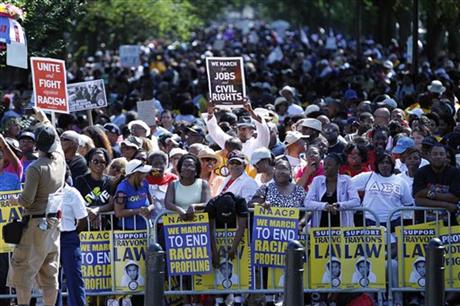
By SUZANNE GAMBOA
Crowds rally at the Lincoln Memorial in Washington to commemorate the 50th anniversary of the 1963 March on Washington Saturday, Aug. 24, 2013. Fifty years ago, on the actual anniversary, April 28, 1963, Dr. Martin Luther King Jr. deliver his “I Have a Dream” speech during the March on Washington. (AP Photo/Jose Luis Magana)
WASHINGTON (AP) — Tens of thousands of people marched to the Martin Luther King Jr. Memorial and down the National Mall on Saturday, commemorating the 50th anniversary of King’s famous speech and pledging that his dream includes equality for gays, Latinos, the poor and the disabled.
The event was an homage to a generation of activists that endured fire hoses, police abuse and indignities to demand equality for African Americans. But there was a strong theme of unfinished business.
“This is not the time for nostalgic commemoration,” said Martin Luther King III, the oldest son of the slain civil rights leader. “Nor is this the time for self-congratulatory celebration. The task is not done. The journey is not complete. We can and we must do more.”
Eric Holder, the nation’s first black attorney general, said he would not be in office, nor would Barack Obama be president, without those who marched.
“They marched in spite of animosity, oppression and brutality because they believed in the greatness of what this nation could become and despaired of the founding promises not kept,” Holder said.
Holder mentioned gays and Latinos, women and the disabled as those who had yet to fully realize Martin Luther King Jr.’s dream. Others in the crowd advocated organized labor, voting rights, revamping immigration policies and access to local post offices.
Rep. John Lewis, D-Ga., the only surviving speaker from the 1963 March on Washington, railed against a recent Supreme Court decision that effectively erased a key anti-discrimination provision of the Voting Rights Act. Lewis was a leader of a 1965 march, where police beat and gassed marchers who demanded access to voting booths.
“I gave a little blood on that bridge in Selma, Ala., for the right to vote,” he said. “I am not going to stand by and let the Supreme Court take the right to vote away from us. You cannot stand by. You cannot sit down. You’ve got to stand up. Speak up, speak out and get in the way.”
Organizers expected about 100,000 people to participate in the event, the precursor to the actual anniversary of the Aug. 28, 1963, march.
Marchers began arriving early Saturday, many staking out their spots as the sun rose in a clear sky over the Capitol. By midday, tens of thousands had gathered on the National Mall.
Lynda Chambers, 58, gave up a day’s pay to attend because her retail job does not provide paid vacation. Even as a 7-year-old at the time of the original march, she felt alienated and deprived of her rights. Remembering those feelings, she said, she was compelled to make the trip Saturday.
“I wanted to have some sort of connection to what I have always known, as far as being a black person,” she said.
Speakers frequently mentioned persistent high unemployment among blacks, which is about twice that of white Americans, and the acquittal of George Zimmerman for the shooting death of unarmed black teenager Trayvon Martin in Florida. Along the Mall, Martin’s picture was nearly as ubiquitous as King’s.
“I’m here supporting this march because there are so many injustices in this country,” said Alice Long, 59, who traveled from Huntsville, Ala. “I’m very concerned about it because I have a 5-year-old grandson and a 13-year-old granddaughter.”
Long, a NASA administrative assistant, brought along her grandchildren to give them a close-up view of African-American and civil rights history that she said isn’t being taught in schools.
Those in attendance arrived in a post-9/11 Washington that was very different from the one civil rights leaders visited in 1963.
Then, people crowded the steps of the Lincoln Memorial and could get close to King to hear his speech. On Saturday, metal barriers kept people away from the reflecting pool.
Only a small group of attendees was allowed near the memorial. Everyone else had been pushed back and watched and listened to the speeches on big-screen televisions. Police were stationed atop the Lincoln Memorial. There was a media area and VIP seating.
On the day of the anniversary, President Barack Obama will speak from the steps of the Lincoln Memorial, the same place King stood when he delivered his “I Have a Dream” speech. Obama will be joined by former Presidents Bill Clinton and Jimmy Carter. Churches and groups have been asked to ring bells at 3 p.m. Wednesday, marking the exact time King spoke.
On Friday, a coalition of black leaders issued what they said is the 21st century agenda for the nation as it marks the watershed civil rights event that helped bring about the 1964 Civil Rights Act and the 1965 Voting Rights Act. The 1963 march drew some 250,000 to the National Mall and ushered in the idea of massive, nonviolent demonstrations.
The leaders named economic parity, equity in education, voting rights, health care access and criminal justice reform as national policy priorities.
Organizers of Saturday’s march hoped this year’s event would serve to inspire people again to educate themselves about issues they see as making up the modern civil rights struggle.
“It’s very difficult to stomach the fact that Trayvon wasn’t committing any crime. He was on his way home from the store,” Sybrina Fulton, Trayvon’s mother, said Friday as she prepared to participate in the march. “Don’t wait until it’s at your front door. Don’t wait until something happens to your child. … This is the time to act now. This is the time to get involved.”
___


